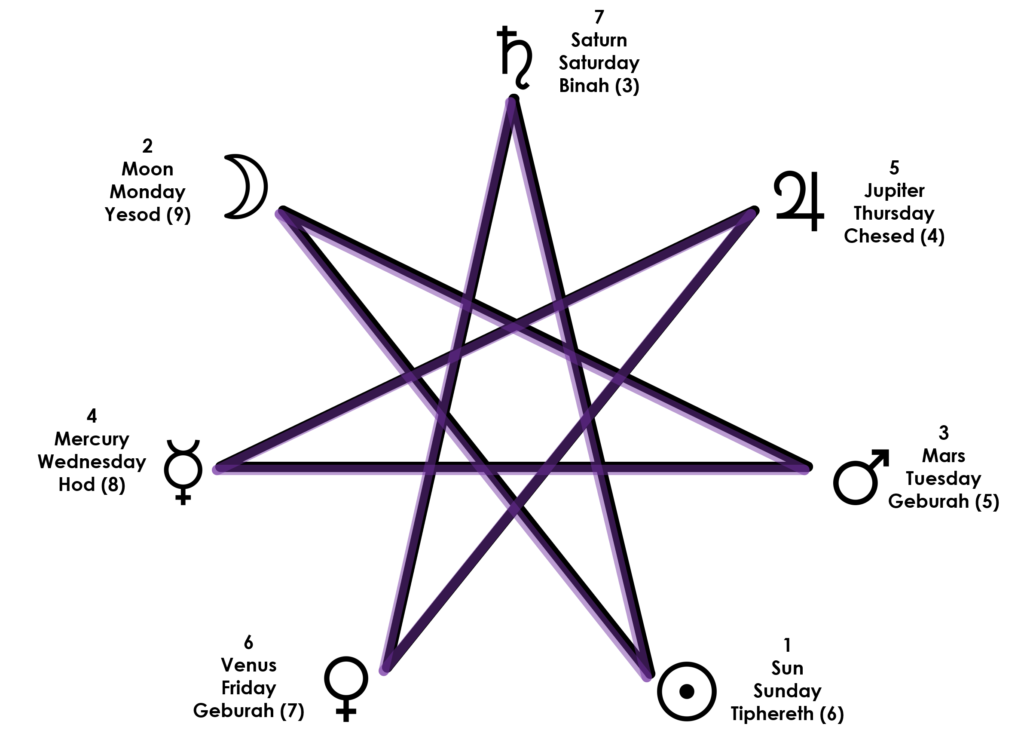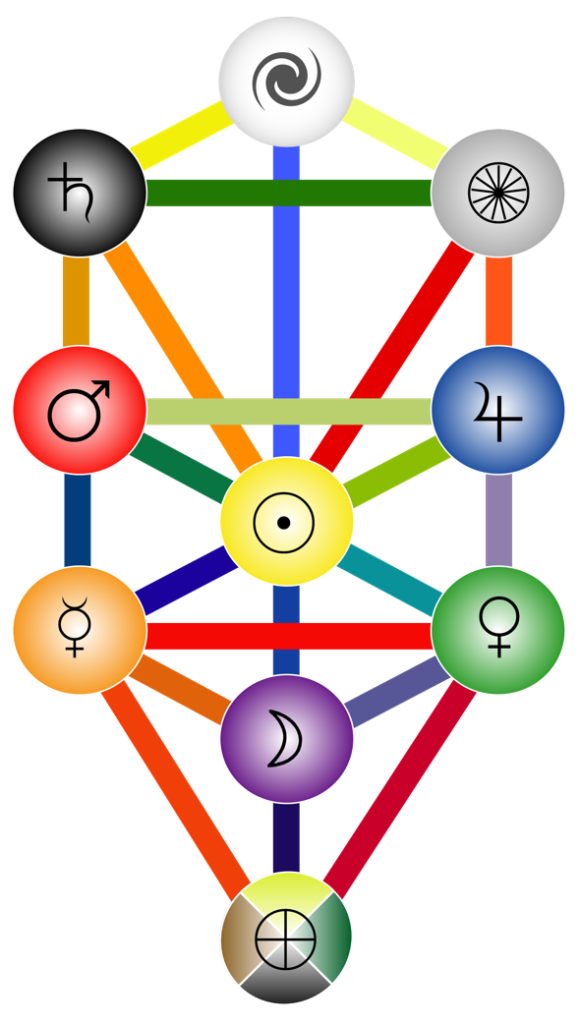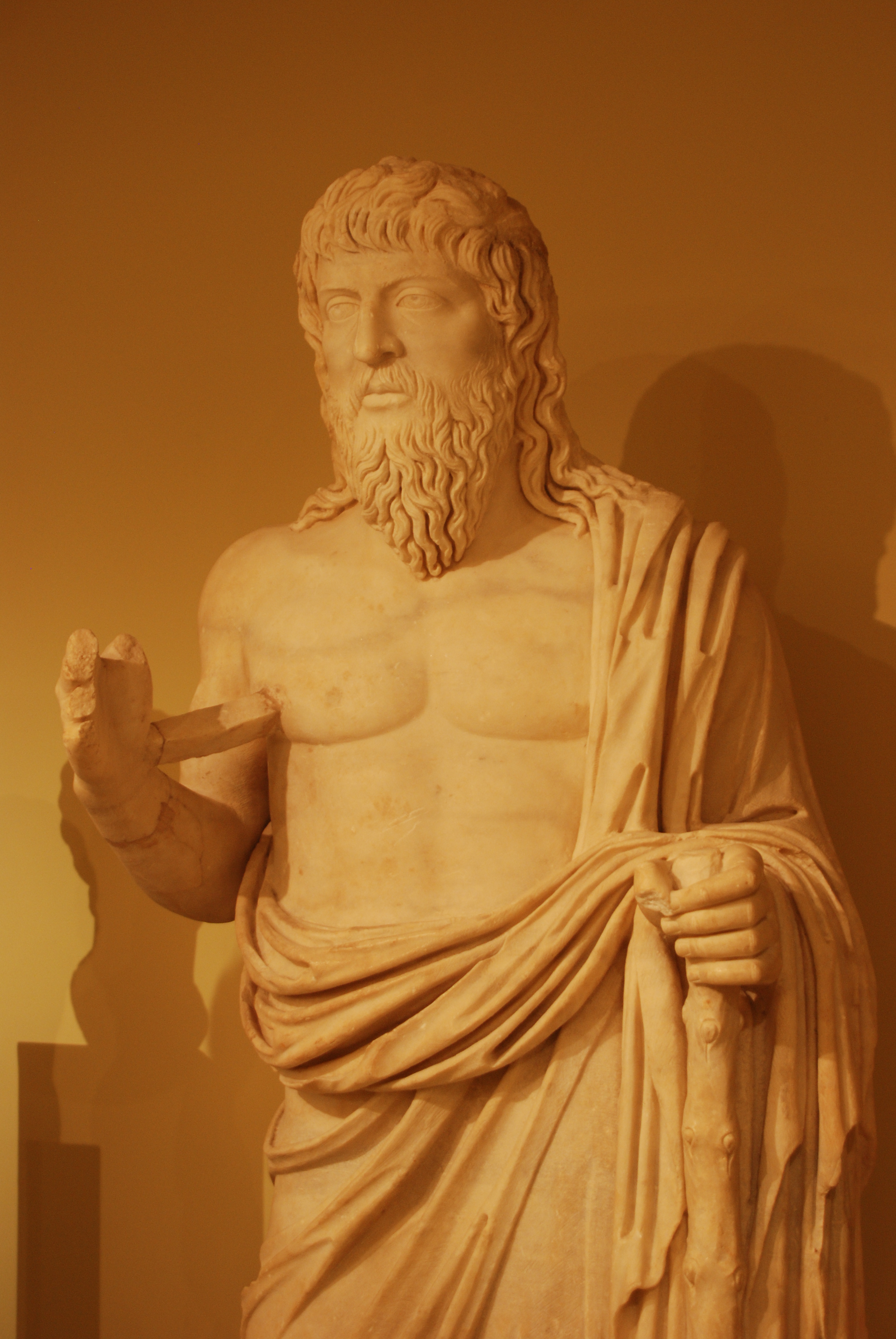Apollonius of Tyana (Ancient Greek: Ἀπολλώνιος ὁ Τυανεύς; c. 15 – c. 100 AD),[2] sometimes also called Apollonios of Tyana, was a Greek Neopythagorean philosopher from the town of Tyana in the Roman province of Cappadocia in Anatolia. Being a 1st-century orator and philosopher around the time of Jesus, he was compared with Jesus of Nazareth by Christians in the 4th century[3] and by other writers in modern times.
Life dates
Apollonius was born into a respected and wealthy Greek family.[4][5] Although the precise dates of his birth and death are uncertain, most scholars agree that he was a contemporary of Jesus of Nazareth. His primary biographer, Philostratus the Elder (circa 170 – c. 247), places him circa 3 B.C. – c. 97 A.D. .[2][6]
Sources
By far the most detailed source is the Life of Apollonius of Tyana, a lengthy, novelistic biography written by the sophist Philostratus at the request of empress Julia Domna. She died in 217 AD,[7] and he completed it after her death, probably in the 220s or 230s AD. Philostratus’s account shaped the image of Apollonius for posterity and still dominates discussions about him in our times. To some extent it is a valuable source because it contains data from older writings which were available to Philostratus but disappeared later on. Among these works are an excerpt (preserved by Eusebius) from On Sacrifices, and certain alleged letters of Apollonius. The sage may have actually written some of these works, along with the no-longer extant Biography of Pythagoras.[8] At least two biographical sources that Philostratus used are lost: a book by the imperial secretary Maximus describing Apollonius’s activities in Maximus’s home city of Aegaeae in Cilicia, and a biography by a certain Moiragenes. There also survives, separately from the life by Philostratus, a collection of letters of Apollonius, but at least some of these seem to be spurious.[9]
One of the essential sources Philostratus claimed to know are the “memoirs” (or “diary”) of Damis, an acolyte and companion of Apollonius. Some scholars claim that the notebooks of Damis were an invention of Philostratus,[10] while others think it could have been a real book forged by someone else and naively used by Philostratus.[11] Philostratus describes Apollonius as a wandering teacher of philosophy and miracle-worker who was mainly active in Greece and Asia Minor but also traveled to Italy, Spain, and North Africa, and even to Mesopotamia, India, and Ethiopia. In particular, he tells lengthy stories of Apollonius entering the city of Rome in disregard of emperor Nero’s ban on philosophers, and later on being summoned, as a defendant, to the court of Domitian, where he defied the emperor in blunt terms. He had allegedly been accused of conspiring against the emperor, performing human sacrifice, and predicting a plague by means of magic. Philostratus implies that upon his death, Apollonius of Tyana underwent heavenly assumption.[12]
How much of this can be accepted as historical truth depends largely on the extent to which modern scholars trust Philostratus, and in particular on whether they believe in the reality of Damis. Some of these scholars contend that Apollonius never came to Western Europe and was virtually unknown there until the 3rd century AD, when Empress Julia Domna, who was herself from the province of Syria, decided to popularize him and his teachings in Rome.[13] For that purpose, so these same scholars believe, she commissioned Philostratus to write the biography, where Apollonius is exalted as a fearless sage with supernatural powers, even greater than Pythagoras. This view of Julia Domna’s role in the making of the Apollonius-legend gets some support from the fact that her son Caracalla worshipped him,[14] and her grandnephew emperor Severus Alexander may have done so as well.[15]
Apollonius was also a known figure in the medieval Islamic world[16] as described later in this article.
Comparisons with Jesus
Biblical scholar Bart D. Ehrman relates that in the introduction to his textbook on the New Testament, he describes an important figure from the first century without first revealing he is writing about Apollonius of Tyana:
Even before he was born, it was known that he would be someone special. A supernatural being informed his mother the child she was to conceive would not be a mere mortal but would be divine. He was born miraculously, and he became an unusually precocious young man. As an adult he left home and went on an itinerant preaching ministry, urging his listeners to live, not for the material things of this world, but for what is spiritual. He gathered a number of disciples around him, who became convinced that his teachings were divinely inspired, in no small part because he himself was divine. He proved it to them by doing many miracles, healing the sick, casting out demons, and raising the dead. But at the end of his life he roused opposition, and his enemies delivered him over to the Roman authorities for judgment. Still, after he left this world, he returned to meet his followers in order to convince them that he was not really dead but lived on in the heavenly realm. Later some of his followers wrote books about him.[17]
Ehrman goes on to explain that Apollonius was a real person and that his followers believed Jesus to be a fraud.
Sossianus Hierocles argued in the 3rd century that the doctrines and the life of Apollonius were more valuable than those of Christ, a viewpoint reportedly held by both Voltaire and Charles Blount during the Age of Enlightenment.[18] In his 1909 book The Christ, John Remsburg postulated that the religion of Appolonius disappeared because the proper conditions for its development did not exist. Buddhism, Christianity and Islam thrived however, because the existing conditions were favorable.[19] In his 1949 book The Hero with a Thousand Faces, comparative mythology scholar Joseph Campbell lists both Apollonius and Jesus as examples of individuals who shared similar hero stories, along with Krishna, Buddha and others.[20] Similarly, Robert M. Price in his 2011 The Christ-Myth Theory and its Problems, notes that the ancients often compared Jesus with Apollonius and that they both fit the mythic hero archetype.[21] G. K. Chesterton (the writer and Christian apologist), however, noted that the unique trial, suffering and death of Christ stand in stark opposition to the stories about Apollonius which he felt were very likely spurious.[22]
Similarities shared by Apollonius and Jesus [23]
- Birth miraculously announced by God
- Religiously precocious as a child
- Asserted to be a native speaker of Aramaic
- Influenced by Plato/ reflected Platonism (Jesus)
- [Renounced/ denounced (Jesus)] wealth
- Followed abstinence and asceticism
- Wore long hair and robes
- Were unmarried and childless
- Were anointed with oil
- Went to Jerusalem
- Spoke in [metaphors/ parables] (Jesus)
- Saw and predicted the future
- Performed miracles
- Healed the sick
- Cast out evil spirits/ Drove out demons (Jesus)
- Raised the daughter of a [Roman official/ Jewish official (Jesus)] from the dead
- Spoke as a “law-giver”
- Was on a mission to bring [Greek culture/ Jewish culture (Jesus)] to [the “barbarians”/ the ” nations” (Jesus)]
- Believed to be “saviors” from heaven
- Were accused of being a magician
- Were accused of killing a boy
- Condemned [by Roman emperor/ by Roman authorities (Jesus)]
- Imprisoned [at Rome/ at Jerusalem (Jesus)]
- Was assumed into heaven/ Ascended into heaven (Jesus)
- Appeared posthumously to a detractor as a brilliant light
- Had his image revered [in temples/ in churches (Jesus)]
Historical facts
With the exception of the Adana Inscription,[clarification needed] little can be derived from sources other than Philostratus. As James Francis put it, “the most that can be said … is that Apollonius appears to have been a wandering ascetic/philosopher/wonderworker of a type common to the eastern part of the early empire.”[24] What we can safely assume is that he was indeed a Pythagorean and as such, in conformity with the Pythagorean tradition, opposed animal sacrifice, and lived on a frugal, strictly vegetarian diet.[25] A minimalist view is that he spent his entire life in the cities of his native Asia Minor (Turkey) and of northern Syria, in particular his home town of Tyana, Ephesus, Aegae, and Antioch,[26] though the letters suggest wider travels, and there seems no reason to deny that, like many wandering philosophers, he at least visited Rome. As for his philosophical convictions, we have an interesting, probably authentic fragment of one of his writings (On sacrifices) where he expresses his view that God, who is the most beautiful being, cannot be influenced by prayers or sacrifices and has no wish to be worshipped by humans, but can be reached by a spiritual procedure involving nous (intellect), because he himself is pure nous and nous is also the greatest faculty of humankind.[27]
Miracles
Philostratus implies on one occasion that Apollonius had extra-sensory perception (Book VIII, Chapter XXVI). When emperor Domitian was murdered on September 18, 96 AD, Apollonius was said to have witnessed the event in Ephesus “about midday” on the day it happened in Rome, and told those present “Take heart, gentlemen, for the tyrant has been slain this day…”. Both Philostratus and renowned historian Cassius Dio report this incident, probably on the basis of an oral tradition.[citation needed] Both state that the philosopher welcomed the deed as a praiseworthy tyrannicide.[28]
Journey to India
Philostratus devoted two and a half of the eight books of his Life of Apollonius (1.19–3.58) to the description of a journey of his hero to India. According to Philostratus’ Life, en route to the Far East, Apollonius reached Hierapolis Bambyce (Manbij) in Syria (not Nineveh, as some scholars believed), where he met Damis, a native of that city who became his lifelong companion. Pythagoras, whom the Neo-Pythagoreans regarded as an exemplary sage, was believed to have travelled to India. Hence such a feat made Apollonius look like a good Pythagorean who spared no pains in his efforts to discover the sources of oriental piety and wisdom. As some details in Philostratus’ account of the Indian adventure seem incompatible with known facts, modern scholars are inclined to dismiss the whole story as a fanciful fabrication, but not all of them rule out the possibility that the Tyanean actually did visit India.[29]
What seemed to be independent evidence showing that Apollonius was known in India has now been proved to be forged. In two Sanskrit texts quoted by Sanskritist Vidhushekhara Bhattacharya in 1943[30] he appears as “Apalūnya”, in one of them together with Damis (called “Damīśa”), it is claimed that Apollonius and Damis were Western yogis, who later on were converted to the correct Advaita philosophy.[31] Some have believed that these Indian sources derived their information from a Sanskrit translation of Philostratus’ work (which would have been a most uncommon and amazing occurrence), or even considered the possibility that it was really an independent confirmation of the historicity of the journey to India.[32] Only in 1995 were the passages in the Sanskrit texts proven to be interpolations by a modern (late 19th century) forger.[33]
Writings
Several writings and many letters have been ascribed to Apollonius, but some of them are lost; others have only been preserved in parts or fragments of disputed authenticity. Porphyry and Iamblichus refer to a biography of Pythagoras by Apollonius, which has not survived; it is also mentioned in the Suda.[34] Apollonius wrote a treatise On sacrifices, of which only a short, probably authentic fragment has come down to us.[35]
Philostratus’ Life and the anthology assembled by Joannes Stobaeus contain purported letters of Apollonius. Some of them are cited in full, others only partially. There is also an independently transmitted collection of letters preserved in medieval manuscripts. It is difficult to determine what is authentic and what not. Some of the letters may have been forgeries or literary exercises assembled in collections which were already circulated in the 2nd century AD.[citation needed] It has been asserted that Philostratus himself forged a considerable part of the letters he inserted into his work; others were older forgeries available to him.[36]
SOURCE:https://en.wikipedia.org/wiki/Apollonius_of_Tyana
Audio/Video:
The Life of Apollonius of Tyana, by Flavius Philostratus – https://youtu.be/raBxYgC-wsE



